The Pet Monitoring Camera Market is estimated to be valued at USD 63.8 billion in 2025 and is projected to reach USD 108.9 billion by 2035, registering a compound annual growth rate (CAGR) of 5.5% over the forecast period.
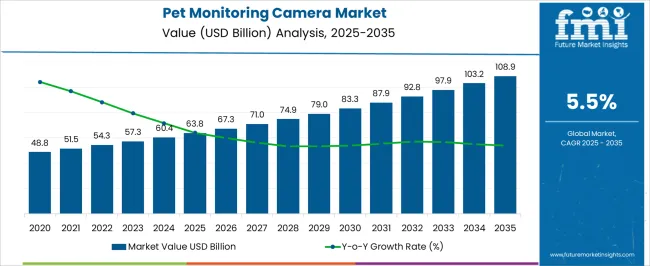
| Metric | Value |
|---|---|
| Pet Monitoring Camera Market Estimated Value in (2025 E) | USD 63.8 billion |
| Pet Monitoring Camera Market Forecast Value in (2035 F) | USD 108.9 billion |
| Forecast CAGR (2025 to 2035) | 5.5% |
The pet monitoring camera market is undergoing rapid evolution, driven by the growing humanization of pets, increased pet adoption rates, and rising awareness of pet wellness. Enhanced connectivity, smart home integration, and demand for real-time remote pet interaction are pushing manufacturers to innovate across functionality, design, and user experience.
Consumer preference is shifting toward intelligent pet care ecosystems that offer seamless video access, health tracking, and behavioral analytics. Furthermore, rising disposable incomes and increasing time spent away from home have boosted the need for two-way interactive and motion-sensing technologies.
The market is also benefiting from expanded e-commerce penetration and product bundling strategies with other pet tech solutions. Future demand is expected to be driven by AI-powered pet behavior analysis, subscription-based monitoring services, and integration with voice assistants and home automation systems.
The market is segmented by Product Type, Application Type, End User Type, Sales Channel Type, and Price Range and region. By Product Type, the market is divided into Two Way Video and Audio Functionality and One Way Video Functionality. In terms of Application Type, the market is classified into Monitoring, Real-Time Bark Alert, Treat-Dispersing, Remote Training, Video and Photo Capture, and Communication. Based on End User Type, the market is segmented into Pet Parents, Veterinarians, and Professional Trainers. By Sales Channel Type, the market is divided into Online Retailers, Hypermarket/Supermarkets, Speciality Stores, Multi-Brand Store, and Discount Stores. By Price Range, the market is segmented into Medium, Premium, and Low. Regionally, the market is classified into North America, Latin America, Western Europe, Eastern Europe, Balkan & Baltic Countries, Russia & Belarus, Central Asia, East Asia, South Asia & Pacific, and the Middle East & Africa.
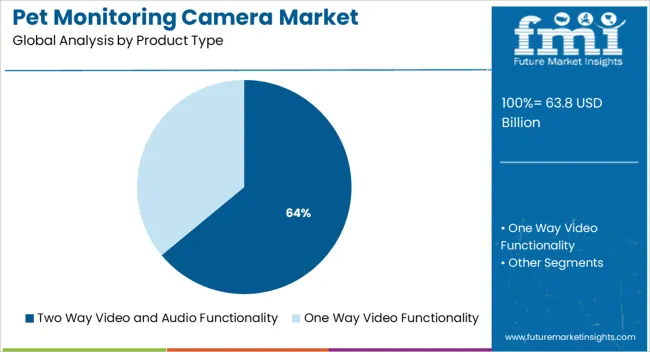
The two way video and audio functionality segment is expected to dominate with a 64.0% share of the overall pet monitoring camera market in 2025. This leadership is being reinforced by growing demand for real-time communication between pets and their owners, particularly during extended periods of absence.
The inclusion of two-way communication enhances emotional bonding, reduces pet anxiety, and provides peace of mind to pet owners. Integration of HD video, night vision, and noise cancellation technologies has improved device performance, encouraging wider adoption.
Additionally, compatibility with mobile applications and smart assistants has made these devices more intuitive and accessible. As households prioritize convenience and responsiveness, two-way functionality has emerged as a standard expectation in premium pet camera models.
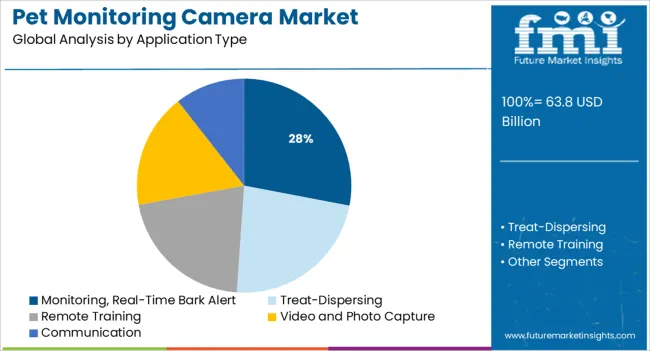
Monitoring and real-time bark alert functionality is projected to account for 28.0% of the market share in 2025, establishing it as a key application segment. This demand is being driven by rising concerns over pet behavior, noise disturbances, and separation stress.
Real-time alerts allow pet parents to take immediate action or reassurance through two-way communication, minimizing potential disruption or stress to the animal. The growth of smart notification systems—enabled by AI and acoustic pattern recognition—has elevated the role of monitoring applications beyond simple observation.
This application is particularly valuable for working professionals, urban dwellers, and multi-pet households seeking better behavior management and response capabilities. The continued refinement of sensor accuracy and personalized alert thresholds is expected to maintain this segment’s relevance across evolving consumer needs.
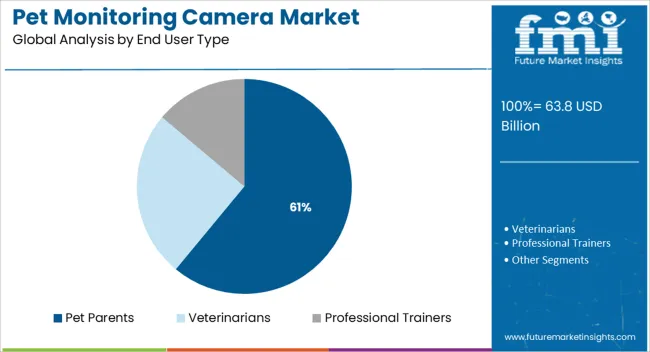
Pet parents are projected to hold a leading 61.0% share of the pet monitoring camera market in 2025. This segment’s dominance is being driven by the emotional value placed on pets as family members and a proactive approach to their well-being.
The increasing availability of user-friendly, app-connected camera systems has made pet monitoring more accessible for everyday households. Growing awareness about pet separation anxiety, coupled with social media trends showcasing pet monitoring habits, has boosted product visibility and desirability.
Furthermore, the rise of single-person households and pet ownership among millennials has strengthened the demand for at-home monitoring tools. As pet parents continue to seek technologies that enhance care, interaction, and peace of mind, their role as primary adopters is expected to deepen.
A multifunctional surveillance camera for pets is one of the latest technological innovations that are evidence of constant technological advancement. The purpose of these multifunctional surveillance cameras for pets is to alert their owners to their pets' requirements.
Petzilla, for example, has developed a pet treat cam called Petzi Treat Cam that performs multiple functions, such as registering pets quickly and interacting with them from a smartphone or tablet. Consumers can see their pets, talk to them, take pictures of them, and even treat them while they are out in the yard.
It is believed that the introduction of technologically improved products has contributed to the growth of the pet monitoring camera market in recent years. The introduction of battery-operated and portable pet monitors is one of the main factors that has contributed to its growth.
In recent years, the North American market has held the largest share of the pet food industry. In the USA alone, the number of pets has increased in comparison to other countries. In the USA, approximately 136 million people own pets, owing to the fact that a large percentage of the population is very fond of their pets.
This, coupled with increasing disposable incomes and increased spending on pet accessories, encourages more people to buy pet monitoring devices in order to keep an eye on their pets.
According to the research, one of the main reasons behind the growth of the North American pet monitoring cameras market is the continued rise in the number of millennial pet owners who are keen on utilizing technology to help take care of their pets while they are at work.
Additionally, an increase in adoption has been attributed to the technological advancement of pet monitoring cameras, which is another important factor. There have been many vendors in this region who have developed pet monitoring cameras, which are not only capable of monitoring pets, but also of feeding them when necessary, as well as entertaining them when needed.
Due to the increasing adoption and humanization of pets, particularly in Singapore, Thailand, Malaysia, and Indonesia, the Asian Pacific pet monitoring camera market is expected to grow substantially during the forecasted period. As a result of changing consumer behavior, pet wellness and health monitoring products are growing in popularity.
Further, growing disposable incomes and improved lifestyles are projected to provide significant growth prospects in India and China. Rapid urbanization has accelerated pet adoption in these countries.
Countries such as China, Japan, Australia, and India have increased their spending on pets. According to a recent study, in Australia, 76% of dogs and 92% of cats are kept as pets, indicating a high demand for surveillance cameras in this country.
The global demand for pet monitoring cameras is projected to grow at a CAGR of 5.5% during the forecast period (2025 to 2035). In terms of total market revenue, the pet monitoring camera market is likely to hold a significant share of the pet care sector.
Since 2020, pet surveillance cameras have mostly been used to watch and communicate with lonely at-home pets. However, with advancements in camera technology, the scope of pet monitoring cameras widened. They are being now used for training, treatment, and motion capture purposes.
Pet monitoring cameras enable owners to communicate with pets, monitor their motion, and train them. Growing concerns regarding the safety of pets along with increasing need for continuously monitoring action and movements of pets is expected to boost the sales of pet monitoring cameras during the forecast period.
Surge in Millennial Pet Owners to Boost Pet Monitoring Camera Sales
One of the primary factors driving sales in the pet monitoring camera market is the global proliferation of millennial pet owners who are eager to use technology to look after their pets while they are at work.
Similarly, rise in pet adoption and increasing knowledge of various pet monitoring options will continue to push the demand for pet monitoring cameras during the forecast period.
Rising Penetration of Advanced Technology to Support Growth of the Pet Monitoring Camera Market
Increasing smart technology integration in household electronic equipment is expected to be a trend during the projection period. Thanks to technologies such as Bluetooth and Wi-Fi connectivity, users can control pet surveillance cameras with smartphones and transmit instructions from anywhere within range of communication inside the house.
The advancement of technology in pet monitoring cameras is also a significant element contributing towards increasing their popularity. Many companies have developed pet monitoring cameras that can not only watch pets but also dispense food and entertain them by performing the function of lasers.
One of the key factors restraining growth of pet monitoring camera market is the high prices of pet monitoring cameras. Low-income consumers avoid purchasing pricey pet surveillance cameras due to a lack of infrastructure support.
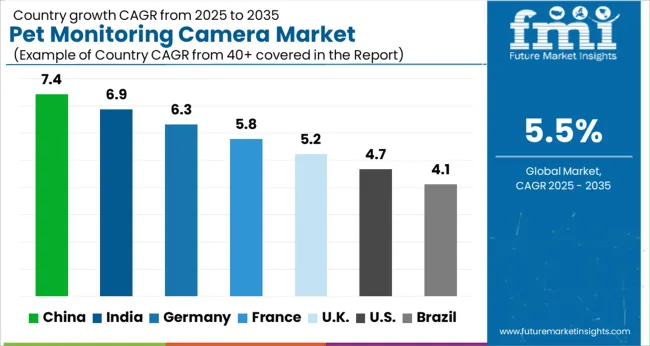
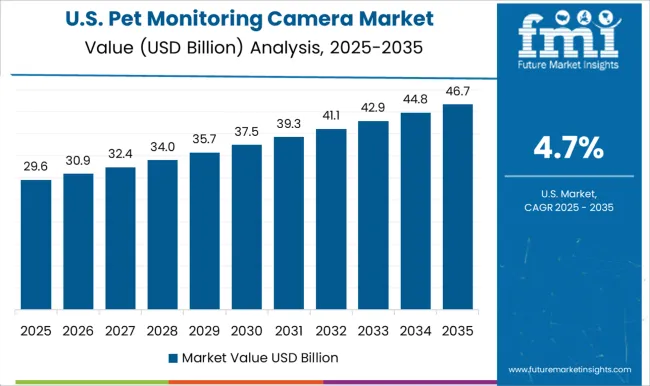
Rapid Adoption of Advanced Technologies Push Demand for Pet Monitoring Cameras in the USA
The market for pet monitoring cameras has grown significantly in recent years, particularly in the USA due rising adoption of smart and advanced technologies, presence of a higher number of pet parents, and growing awareness and concern about pet safety and security in the country.
Furthermore, strong presence of industry heavyweights in the region aids market expansion.
Availability of Pet Monitoring Cameras at Affordable Rates Propelling Market Growth in China
As per FMI, the pet monitoring cameras market in China is predicted to expand at a robust CAGR of 6.5% between 2025 and 2035. This can be attributed to rising spending on pets and pet related products, rapid economic growth, and availability of advanced monitoring cameras on lower prices.
Similarly, shift in customer behaviour toward purchasing pet wellness and health monitoring solutions is increasing market value in China. Furthermore, increasing consumer lifestyles and rising purchasing power in China is expected to generate considerable market revenue possibilities throughout the projection period.
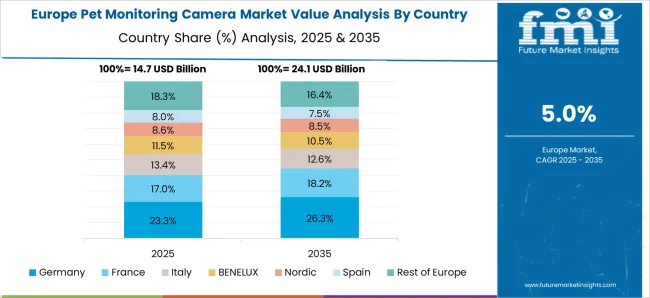
Surge in Pet Adoption Rates Spurring Demand for Pet Monitoring Cameras in the UK
Sales of pet monitoring cameras in the UK is expected to grow at a steady CAGR of 3.5% during the forecast period. This can be attributed to the rapid rise in pet population, presence of favourable pet insurance policies, and growing trend of pet humanization
Demand for One Way Video Functionality Pet Monitoring Cameras to Remain High
Currently, the one-way video feature category accounts for the biggest revenue share of the global pet monitoring camera market and is expected to continue its dominance over the projected period. This is due to features such as laser dot tracking games, treat vending machines, motion detection capabilities, built-in buzzers, picture capturing, and temperature monitoring.
Demand for Low Priced Pet Monitoring Cameras to Remain High Throughout the Forecast Period
Pet monitoring camera comes in three different price ranges which are low, medium, and premium. Although premium price range offers wide variety and multifunctional features, demand for low price range pet monitoring cameras is expected to grow at a higher CAGR during the forecast period.
Pet Monitoring Camera Sales to Remain High in Online Retailers Segment
As per FMI, online retailers segment is likely to contribute most to the global pet monitoring camera market through 2035, owing to the increasing desire for online shopping and rising penetration of internet and smartphones.
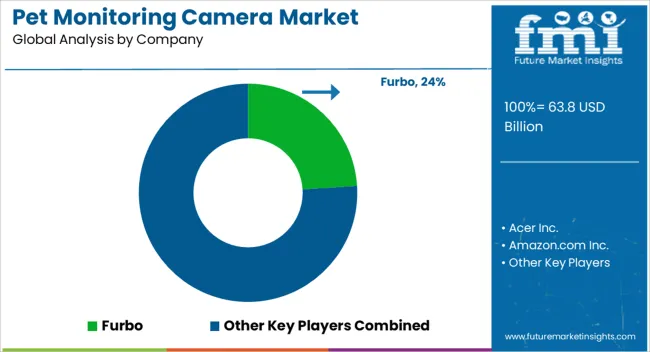
The global pet monitoring camera market is very competitive in nature due to the presence of multiple companies. To improve their revenue, leading pet monitoring camera manufacturers players are focused on releasing new products with advanced characteristics.
For instance,
Similarly, startups like Tomofun, an international pet technology startup founded in 2014 by Victor Chang are continuously introducing new products to expand their customer base.
| Attribute | Details |
|---|---|
| Estimated Market Size (2025) | USD 63.8 billion |
| Projected Market Size (2035) | USD 108.9 billion |
| Anticipated Growth Rate (2025-2035) | 5.5% |
| Forecast Period | 2025 to 2035 |
| Historical Data Available for | 2020 to 2024 |
| Market Analysis | USD Million for Value |
| Key Regions Covered | North America, Latin America, Europe, East Asia, South Asia, Oceania & MEA |
| Key Countries Covered | United States, Canada, Brazil, Mexico, Germany, UK, France, Spain, Italy, Russia, Benelux, South Africa, Northern Africa GCC Countries, China, Japan, South Korea, India, Thailand, Malaysia, Indonesia, Australia & New Zealand. |
| Key Segments Covered | Product Type, Application, Price Range, Sales Channel, End User, and Region |
| Key Companies Profiled | Petcube; Acer Inc.; Amazon.com Inc.; Furbo; Hangzhou Hikvision Digital Technology Co. Ltd.; Lenevo Group Ltd.; PetChatz LLC; Vimtag Technology Co. LTD; Wagz Inc.; Zmodo; Pawbo; Motorola; Cleverdog |
| Report Coverage | Market Forecast, Company Share Analysis, Competition Intelligence, DROT Analysis, Market Dynamics and Challenges, and Strategic Growth Initiatives |
The global pet monitoring camera market is estimated to be valued at USD 63.8 billion in 2025.
The market size for the pet monitoring camera market is projected to reach USD 108.9 billion by 2035.
The pet monitoring camera market is expected to grow at a 5.5% CAGR between 2025 and 2035.
The key product types in pet monitoring camera market are two way video and audio functionality and one way video functionality.
In terms of application type, monitoring, real-time bark alert segment to command 28.0% share in the pet monitoring camera market in 2025.






Our Research Products

The "Full Research Suite" delivers actionable market intel, deep dives on markets or technologies, so clients act faster, cut risk, and unlock growth.

The Leaderboard benchmarks and ranks top vendors, classifying them as Established Leaders, Leading Challengers, or Disruptors & Challengers.

Locates where complements amplify value and substitutes erode it, forecasting net impact by horizon

We deliver granular, decision-grade intel: market sizing, 5-year forecasts, pricing, adoption, usage, revenue, and operational KPIs—plus competitor tracking, regulation, and value chains—across 60 countries broadly.

Spot the shifts before they hit your P&L. We track inflection points, adoption curves, pricing moves, and ecosystem plays to show where demand is heading, why it is changing, and what to do next across high-growth markets and disruptive tech

Real-time reads of user behavior. We track shifting priorities, perceptions of today’s and next-gen services, and provider experience, then pace how fast tech moves from trial to adoption, blending buyer, consumer, and channel inputs with social signals (#WhySwitch, #UX).

Partner with our analyst team to build a custom report designed around your business priorities. From analysing market trends to assessing competitors or crafting bespoke datasets, we tailor insights to your needs.
Supplier Intelligence
Discovery & Profiling
Capacity & Footprint
Performance & Risk
Compliance & Governance
Commercial Readiness
Who Supplies Whom
Scorecards & Shortlists
Playbooks & Docs
Category Intelligence
Definition & Scope
Demand & Use Cases
Cost Drivers
Market Structure
Supply Chain Map
Trade & Policy
Operating Norms
Deliverables
Buyer Intelligence
Account Basics
Spend & Scope
Procurement Model
Vendor Requirements
Terms & Policies
Entry Strategy
Pain Points & Triggers
Outputs
Pricing Analysis
Benchmarks
Trends
Should-Cost
Indexation
Landed Cost
Commercial Terms
Deliverables
Brand Analysis
Positioning & Value Prop
Share & Presence
Customer Evidence
Go-to-Market
Digital & Reputation
Compliance & Trust
KPIs & Gaps
Outputs
Full Research Suite comprises of:
Market outlook & trends analysis
Interviews & case studies
Strategic recommendations
Vendor profiles & capabilities analysis
5-year forecasts
8 regions and 60+ country-level data splits
Market segment data splits
12 months of continuous data updates
DELIVERED AS:
PDF EXCEL ONLINE
PET Film for Face Shield Market Size and Share Forecast Outlook 2025 to 2035
Pet Perfume Market Size and Share Forecast Outlook 2025 to 2035
Pet Shampoo Market Size and Share Forecast Outlook 2025 to 2035
Pet Tick and Flea Prevention Market Forecast and Outlook 2025 to 2035
Pet Hotel Market Forecast and Outlook 2025 to 2035
PET Vascular Prosthesis Market Size and Share Forecast Outlook 2025 to 2035
Pet Food Preservative Market Forecast and Outlook 2025 to 2035
Petroleum Liquid Feedstock Market Size and Share Forecast Outlook 2025 to 2035
Pet Food Ingredients Market Size and Share Forecast Outlook 2025 to 2035
PET Stretch Blow Molding Machines Market Size and Share Forecast Outlook 2025 to 2035
PET Injectors Market Size and Share Forecast Outlook 2025 to 2035
PET Material Packaging Market Size and Share Forecast Outlook 2025 to 2035
Petri Dishes Market Size and Share Forecast Outlook 2025 to 2035
Petroleum And Fuel Dyes and Markers Market Size and Share Forecast Outlook 2025 to 2035
Petrochemical Pumps Market Size and Share Forecast Outlook 2025 to 2035
PET Dome Lids Market Size and Share Forecast Outlook 2025 to 2035
Pet Dietary Supplement Market Size and Share Forecast Outlook 2025 to 2035
PET Imaging Workflow Market Analysis - Size, Share, and Forecast Outlook 2025 to 2035
Petroleum Refinery Merchant Hydrogen Generation Market Size and Share Forecast Outlook 2025 to 2035
Pet Bird Health Market Size and Share Forecast Outlook 2025 to 2035

Thank you!
You will receive an email from our Business Development Manager. Please be sure to check your SPAM/JUNK folder too.
Chat With
MaRIA